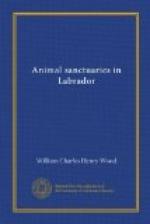From the St. Lawrence to the Barren Grounds three-fourths of the land has been burnt over since the white man came. The resultant loss of all forms of life may be imagined, especially when we remember that the fire often burns up the very soil itself, leaving nothing but rocks and black desolation. Still, there is plenty of fur and feather worth preserving. But nothing can save it unless conservation replaces the present reckless destruction.
DESTRUCTION
When rich virgin soil is first farmed it yields a maximum harvest for a minimum of human care. But presently it begins to fail, and will fail altogether unless man returns to it in one form some of the richness he expects to get from it in another. Now, exploited wild life fails even faster under wasteful treatment; but, on the other hand, with hardly any of the trouble required for continuous farming, quickly recovers itself by being simply let alone. So when we consider how easily it can be preserved in Labrador, and how beneficial its preservation is to all concerned, we can understand how the wanton destruction going on there is quite as idiotic as it is wrong.
Take “egging” as an example. The Indians, Eskimos and other beasts of prey merely preserved the balance of nature by the toll they used to take. No beast of prey, not even the white man, will destroy his own stock supply of food. But with the nineteenth century came the white-man market “eggers”, systematically taking or destroying every egg in every place they visited. Halifax, Quebec and other towns were centres of the trade. The “eggers” increased in numbers and thoroughness till the eggs decreased in the more accessible spots below paying quantities. But other egging still goes on unchecked. The game laws of the province of Quebec distinctly state: “It is forbidden to take nests or eggs of wild birds at any time”. But the swarms of fishermen who come up the north shore of the St. Lawrence egg wherever they go. If they are only to stay in the same spot for a day or two, they gather all the eggs they can, put them into water, and throw away every one that floats. Sometimes three, four, five or even ten times as many are thrown away as are kept, and all those bird lives lost for nothing. Worse still, if the men are going to stay long enough they will often go round the nests and make sure of smashing every single egg. Then




